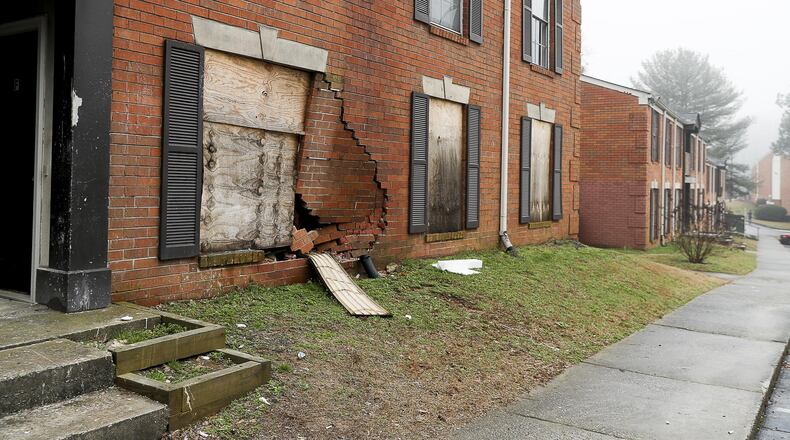Cobb County commissioners are considering an ordinance to require yearly inspections of multifamily housing units after reports of poor living conditions in multiple apartment complexes.
The code amendment, if approved, would require apartment housing properties with four or more units to undergo yearly inspections for business license renewals starting in 2024. This would give property owners roughly one year to hire a certified building inspector approved by the county to conduct inspections.
Currently, Cobb has a complaint system to address tenant-landlord issues. Anyone can request an inspection from the county, but many tenants fear retribution from their landlords, said Jessica Guinn, Cobb’s community development director.
“But unless they make that outreach to us, we can’t go in, and we can’t inspect the units,” she said.
Richard Pellegrino is the field director for the Cobb chapter of the Southern Christian Leadership Conference which addresses civil rights issues in the county — most recently, he said, involving affordable housing and homelessness prevention.
“Even though there’s a law against whistleblowers being retaliated against in Georgia, you know, that often happens,” he said. “People’s leases are not renewed because they complained about living conditions.”
Guinn said the ordinance will help the county be more proactive. Under the proposal, a minimum of 25% of units in every apartment building in unincorporated Cobb with four or more units would need internal inspections each year. So after four years, all of the units would have been evaluated. In addition, a yearly external inspection would be required for the entire property.
“If they don’t do the inspections, they’re not going to be able to renew their business license, and then they’re going to fall into all the penalties that are associated with failure to renew your business,” Guinn said.
“Dangerous Dwellings” — a year-long Atlanta Journal-Constitution investigation into criminal activity and unsafe living conditions at apartment complexes across metro Atlanta — brought attention to the problems with many apartment complexes and helped motivate some local officials to address those issues.
Sandy Springs, Fulton County and now Cobb County are seeking to crack down on multi-family housing conditions partially in response to the AJC’s investigation. Dunwoody and Smyrna have inspection requirements already in place, which Cobb modeled its code after, Guinn said.
The Cobb proposal comes after years of tenants facing poor living conditions in apartment complexes in the county.
Monica DeLancy, an activist for tenants’ rights and founder of the We Thrive in Riverside Renters Association, helped organize tenants in south Cobb apartment complexes back in 2019 to shed light on their uninhabitable living conditions and fight their evictions.
Credit: HYOSUB SHIN / AJC
Credit: HYOSUB SHIN / AJC
The tenant-landlord battle led to eviction trials, and the magistrate court ruled in favor of the tenants, who were awarded damages. The evictions were dismissed, and the landlord and the county went to court over thousands of dollars in code violation fines, the AJC previously reported.
The landlord later settled the dispute with the county outside of court and sold the property, DeLancy said.
While the proposed ordinance is a step in the right direction in addressing housing issues, it may be less effective without increased fines for violations, Pellegrino said.
“The penalties are less expensive than fixing the issues. So, typically, they’ll get a slap on the hand with fines,” he said.
Under the proposed code, if the inspector reports that the units are not in compliance, the property owner would have to submit a plan of action to bring the property up to code. An extension can be granted for up to one year except in cases with a life-threatening safety issue.
The property owner “would have to work with the building official, to tell us what your plan is to address the issues,” to get an extension, Guinn said. But they won’t face citations or fines until after the extension is up and if the repairs still aren’t completed.
“If they can show us, ‘Here’s our plan for how we’re going to address this,’ and they do it, we’re not going to fine them,” Guinn said.
DeLancy has concerns over whether the county will be able to ensure the property owner follows through on repairs, which she said code enforcement has slacked on in the past.
“If [tenants] did contact code enforcement, they were responsive. Code enforcement would come out. But the follow-through?” she said. “There was no clear plan on the follow-through of the suggested repairs.”
Pellegrino and DeLancy both said partnership is the key to solving the subpar living conditions in Cobb County.
“We want to make sure we’re building partnerships with the communities, right? Because this is where we live,” DeLancy said. “Building up communities and making sure people know that we’re not just renting a unit; this is our home.”
The proposed multifamily housing inspection is in a code amendment package the board is expected to vote on this fall. Public hearings for the entire package will be held on Sept. 13 at 9 a.m. and Sept. 27 at 7 p.m.
About the Author
Keep Reading
The Latest
Featured





